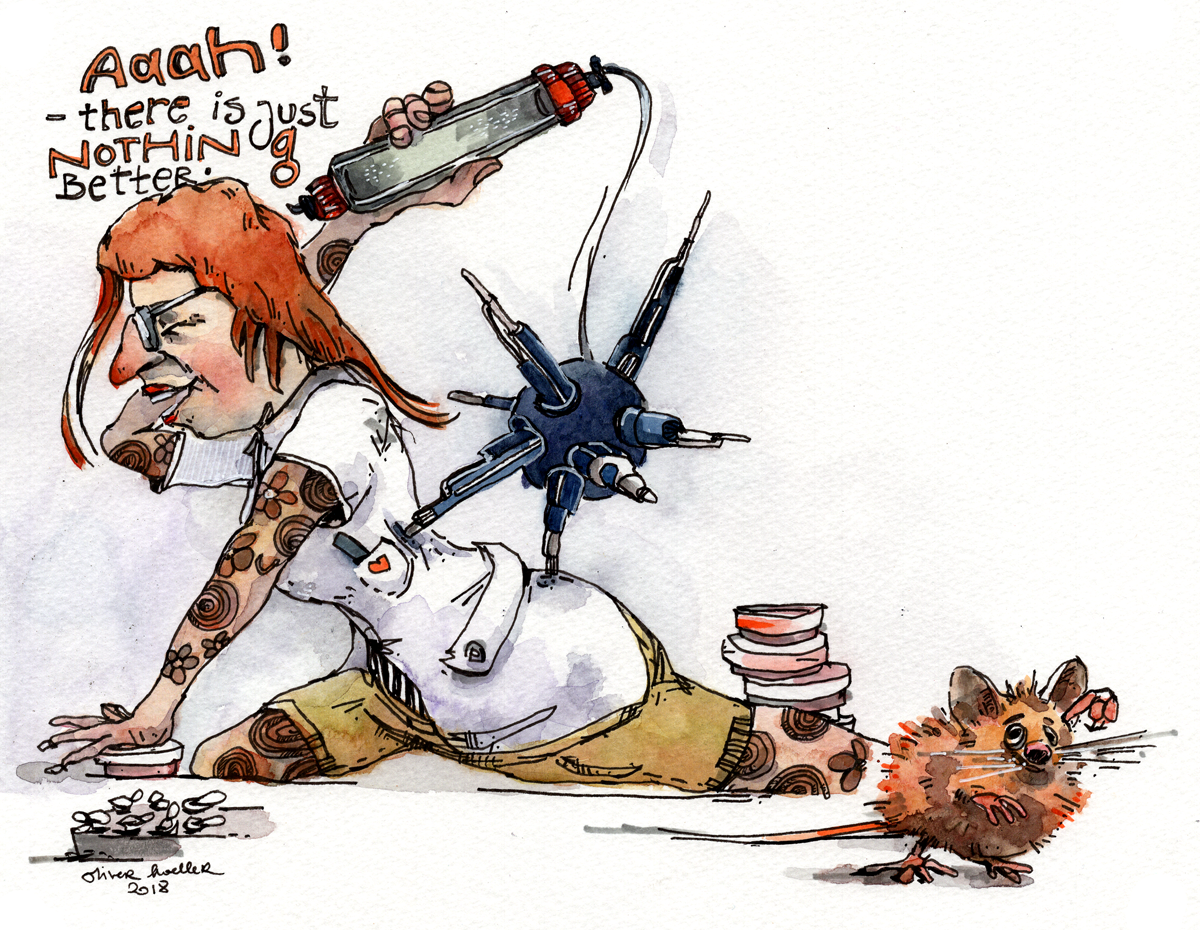
Getting feedback is never easy. But the gain is always worth the pain.
Giving scientific presentations is difficult. It’s hard to stand up and present YOUR data, lovingly crafted and polished, only to see it remorselessly whittled away under a hail of questions. Why did you choose that control? Wouldn’t it have been better to have done this other one? Why did you choose that assay? Did you try some other assay?
One of the hardest things is learning that no matter how hard you’ve tried to cover all the bases, how hard you’ve worked to make your conclusions as tight as possible, someone in the audience can always think of something you haven’t done, or should have done.
It’s a horrible feeling. That “Ohhhhh no” moment. The loss of cabin pressure. The Earth suddenly yawning in front of you. The suspension of time, seconds suddenly stretching into minutes. Sweat prickling on your underarms, your nape, your back, maybe visibly beading on your forehead. Hearing your own voice quaver in response. Hearing yourself desperately prevaricate. Seeing your hands shake.
It’s chastening and embarrassing, and not easy to learn to accept – in fact, one of the commonest rookie errors is getting defensive or overly aggressive in response.
If anything, when it comes to publishing, it can get even worse. More parameters, more variables, more things to change. Should the units be molar ellipticity or delta epsilon? Should the line colour be bright or muted? Are the panels properly aligned? Multiple iterations of figures, multiple drafts of the manuscript. And that’s just when you’re dealing with your co-authors before the real cycle of submission and assessment begins.
It’s guaranteed that every single person you show it to will find something wrong, or something that could possible be changed.
And it’s guaranteed that no matter how many friends and colleagues you get feedback from, the reviewers will still do their damnedest to find fault, sometimes in rather undiplomatic language.
Science is replete with such examples, because of its peculiar – possibly unique – system of self-checking at every level. There’s self-surveillance, within-group surveillance (group meetings), within-department surveillance, within your research focus, within entire scientific communities. Everyone always asking, can I believe this? What has been shown? What has not been shown? Is there a better or more precise interpretation? At every stage findings are analysed, scrutinised, and weighed up.
And for its practitioners, it’s frequently agony. To be challenged, over and over again, about the veracity and quality of your work – especially when you’ve probably been a high-achiever at school and unused to negative feedback – is exhausting. No two ways about it, you need to develop a thick skin, or the continual flaying simply kills your enthusiasm.
So why do it? What kind of right-minded individual subjects themselves to this level of punishment? Something that goes beyond casually asking for feedback and into a rarified of realm of professional masochism that’s perhaps only occupied by sportsmen and -women. People in showbusiness might be subjected to a similar level of scrutiny, often in extremely personal terms, but they’re under no compunction to act on it – you’re free to ignore a bad review and anyway, you can’t please everybody.
Only scientists and elite athletes willingly subject themselves to such extremes of – respectively – mental and physical torment, and the ultimate reason is the same: to better themselves. Because for all the trauma associated with the publication of scientific work, in one respect opinions are united – the peer review process, that unsentimental and critical evaluation by both colleagues and reviewers, always results in a better and more finely-honed product.
It’s undoubtedly perverse, this wilful seeking-out of humiliation. In business, even in sports, you hide your weaknesses and keep on the attack. Science is peculiar in that we invite people to take their best shot at us. It’s not even rope-a-dope, because that tactic carries a kernel of self-preservation.
Part of the experience lies in developing a sense of what are important suggestions and what are trivial ones. Just as is developing mental resilience. Not everybody is capable of providing feedback in sympathetic terms; too many people forget that their role as informal or formal referees is to judge, not to execute; too few stop to consider the impact that a thoughtlessly written sentence can have on someone who’s put years of graft into a particular story.
So try this: turn it around. Just as you can kid yourself that nerves are actually a sign of excitement, you can find pleasure in being punished. You should seek out people who can dole out the toughest criticism possible – and the best ones know how to do it in a constructive and impersonal way, able to let you see that they’re judging the data and not you. Find those people, and encourage them to do their worst. Submit to the paddling, the spanking, the whipping, the clamping, everything they can dish out to your poor naked data. Because in the long run, it can only benefit. And who knows, maybe you’ll learn to like it.







Join the FEBS Network today
Joining the FEBS Network’s molecular life sciences community enables you to access special content on the site, present your profile, 'follow' contributors, 'comment' on and 'like' content, post your own content, and set up a tailored email digest for updates.